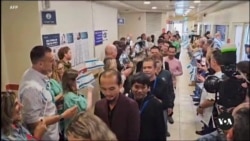Twenty-three Thai citizens have returned home from a weeks-long ordeal in Gaza; Hamas had taken the migrant workers captive during the militants' October 7 assault on Israel.
It was the sixth day of Wichian Temthong's employment on an avocado farm when Hamas militants stormed into kibbutz Sa'ad in a hail of bullets and grenades, killing seven other Thai migrant workers and taking him hostage.
He was marched into Gaza, his hands tied by wire, and spent the next seven weeks in captivity until his release in late November alongside 22 other Thais during a now-lapsed cease-fire.
The 37-year-old is back in northeastern Thailand, at home surrounded by the love of family and a close-knit rural community that he says helps him through the sleepless nights.
But his thoughts are already drifting toward a return to Israel to complete his employment contract and go beyond the subsistence economy that caps the aspirations of people in his village of Ban Chaiyaphot in Buriram, in Thailand's Isan region.
"They let me take a six-month break until I'm mentally recovered. By then if they stop fighting, I will request to return to work. I only worked for six days, I haven't earned anything yet," he said, as his youngest son climbed over him.
"Without me, things would be really hard around here. My wife only earns 10,000 baht ($280/ month), my mom doesn't have any income, and I've got two kids. I have this once-in-a-lifetime opportunity so I want to go back."
His wish list is simple: to support his parents, build a home and a nest egg to pay for his two young sons (ages 5 and 10) to be educated — impossible tasks on the daily laborer's wages of around $10 in his home area.
In Israel, Thai workers on fruit farms and in factories can earn up to $1,700 a month on contracts that run for a maximum of five years. That means sending home upward of $15,000 a year — around five times the annual salary in the rice bowl Isan.
More than 30,000 Thais worked in Israel before the conflict erupted. Thousands have returned home, but many have stayed and others are poised to join them as soon as the violence ends.
Inequality shapes choices
Migration to Thailand's cities or overseas is shaping Isan's communities, as the young seek fortunes outside and successive governments fail to substantially raise incomes or education levels.
"Isan is Thailand's poorest region; often parents rely on their children to support them," said Chalee Loysoong, adviser to the Thai Labour Solidarity Committee.
"Migration has changed the sense of community; it's deteriorated the culture and tradition," he told VOA. "We used to live like a family in a village, but migration forced us to be estranged from one another and focus only on survival."
A World Bank study published last week said Thailand remains one of the most unequal nations in East Asia "as over half the country's wealth is held by the richest 10 percent of the population."
"In 2020, the average per capita GDP in Bangkok was more than 6.5 times that of the Northeast region, which had the lowest GDP per capita in the country."
Low educational attainment at poorly funded rural schools, including poor preschool enrollment, play out into high dropout rates, the study said, putting much of Isan's youth on course for a lifetime of manual work.
Nine still in Gaza
Nine other Thais remain inside Gaza — and to protect them none of the freed Thai workers is willing to speak about conditions of their captivity.
"I've spoken to a few leaders of several nations and have confirmed that the hostages are being held in several locations," Thai Foreign Minister Parnpree Bahiddha-Nukara told reporters at the airport November 30.
"So no one knows whether the remaining nine hostages are together or held in separate locations. No one knows when these nine will be freed," he said, pledging to keep up the diplomacy to free them.
At his home in Surin province, his wrists covered in the orange holy threads practiced by Thai Buddhists, another freed hostage, Khomkrit Chombua, 28, said he worked in Israel for four years — just enough to build most of the house for his family.
"I'm so happy to be back. It feels like I've been reborn," he told VOA.
He has not ruled out a return to Israel.
"I want to spend time with my folks first, finishing up the house I built for them. And I'll decide later."





